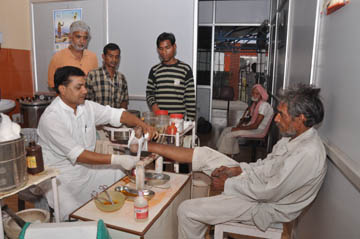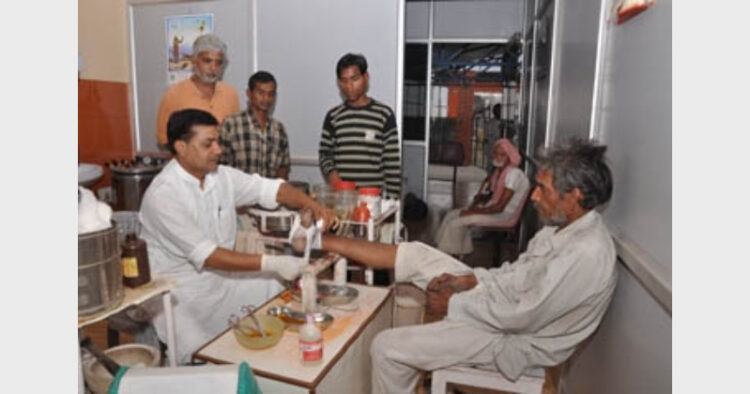Ashish Gautam of Haridwar-based Divya Prem Sewa Mission fights against the social stigma faced by lepers
 Overpowered in 2005, leprosy still haunts. Reasons—the disease might have been eliminated from the human body but it still exists in the minds of people, as they are not ready to accept the leprosy patients who have recovered. In most cases even the family members do not allow such people to stay with them. As a result, they are forced to live in roadside jhuggis, river banks or outside general localities. This is evident from over 700 lepers’ colonies recorded by the government in different parts of the country. In such circumstances, the efforts of Shri Ashish Gautam shows the way. Through Divya Prem Sewa Mission he is not rehabilitating the lepers but also fighting against the social stigma associated with the disease.
Overpowered in 2005, leprosy still haunts. Reasons—the disease might have been eliminated from the human body but it still exists in the minds of people, as they are not ready to accept the leprosy patients who have recovered. In most cases even the family members do not allow such people to stay with them. As a result, they are forced to live in roadside jhuggis, river banks or outside general localities. This is evident from over 700 lepers’ colonies recorded by the government in different parts of the country. In such circumstances, the efforts of Shri Ashish Gautam shows the way. Through Divya Prem Sewa Mission he is not rehabilitating the lepers but also fighting against the social stigma associated with the disease.
Pramod Kumar
Like polio, leprosy too has mostly been eliminated from India, but its victims, even after recovering, are still forced to live a marginalised life away from their families and general localities. There are around 700 lepers’ colonies all over the country, where about two lakh people live a deserted, neglected and discriminated life. Even if they do not have the disease, merely the address of a leper colony is reason enough for disqualification for applying to a respectable job or being denied admission in a school. Recently, in Bihar, a child was denied admission in school merely because someone in his family had history of leprosy.
Even after being arrested, leprosy remains the world’s highest burden of disease accounting for close to 58 per cent of the cases in the world. The burden has been recorded highest among the Scheduled Castes (18.40 per cent) and Scheduled Tribes (15.83 per cent), as majority of these people in rural areas keep away from health facilities for fear of stigma. A Union Ministry of Health and Family Welfare’s report says that a total of 83,000 cases are on record giving an average prevalence rate of 0.68 per 10,000 population, though 530 out of the 640 districts have achieved elimination level. Chhattisgarh (1.69 per 10,000 population) and Dadra & Nagar Haveli (2.93 per 10,000) have the prevalence rate between 1 and 3 per 10,000.
However, during last three years the disease has registered a sharp rise. A total of 1.27 lakh new cases were detected in 2011-12 giving an Annual New Case Detection Rate (ANCDR) of 10.35 per 100,000 population, marginally less than that of 10.48 in 2010-11. The experts attribute this rise to the lack of interest in the authorities because they feel the disease has now gone.
In such a grim scenario, Divya Prem Sewa Mission (DPSM), Haridwar, seems to be an oasis in a desert for the leprosy afflicted people. Started in 1997 in Chandighat area of the holy city, DPSM not only provides free medical care to these people but also makes arrangements for their rehabilitation. Today, around 100 such patients receive medical care everyday and more than 250 children stay in two hostels run exclusively for the children of lepers. “A leper has to suffer on many accounts. The disease cripples him/her to the extent that he/she does not remain fit to work hard. The bigger problem is that their healthy children or the spouse too do not get a respectable job. The only option left to them is begging. But in the DPSM we are trying to ensure that no leper or his/her family member is found begging anywhere and they should have a respectable means of earning. I feel satisfied to say that we have been successful in achieving this goal to some extent,” says Shri Ashish Gautam, the founder of DPSM, while talking to Organiser.
When asked how he feels while serving these socially singled out people, Ashish says, “It is not a matter of pride for the lepers that we are serving them, rather it is a distinguished honour for us that they have provided us an opportunity to serve them. I basically see a form of God in them, and feel that I am serving the God in the form of these people.” These inspiring words speak volumes of the humility of this man.
Ashish got attracted towards spirituality since childhood. While pursuing his studies at Allahabad University, he was deeply motivated by the teachings of Swami Vivekananda and decided to follow his path of self-realisation. During his studies, he encountered with several social and religious organisations also like the Rashtriya Swayamsevak Sangh (RSS) and Akhil Bharatiya Vidyarthi Parishad, but finally he found satisfaction in the service of lepers.
Initially, Ashish started dressing some lepers in the area nearby Najibabad overbridge in Haridwar. With a small sum of Rs 500 his friends bought a dilapidated hut and managed to convince a final year medical student Dr Nitin Agarwal from Rishikul Medical College to sit at the primitive dispensary for a couple of hours daily. Soon, the lepers and other poor people started flowing in for medical care. Then Ashish moved to a lepers’ colony of Chandighat. The initial small makeshift medical facility basically laid the foundation of the present day Divya Prem Sewa Mission.
“I never had any success criteria in my mind, while starting the Mission. The sole purpose was to serve the lepers. I simply could not withstand the agony of these lepers, with one wounded person dressing the other bleeding person. My friends and family initially cautioned me about serving these people and suggested that I might catch the disease myself. However, see, I am perfectly healthy, which disapproves this popular myth. Perhaps, the biggest success that the Mission has achieved is that people from all walks of life visit here without fear. The attitude of the society is also changing towards these people. This is the biggest success for us, as change of mindset is the toughest challenge today in case of these lepers,” added Ashish Bhaiya, as Ashish Gautam is fondly called.
In fact, this change of mindset towards the lepers is the biggest challenge today for all of us. Because even after recovering from the crippling disease, these people feel neglected, marganilised and discriminated at every step. After all, what is the fault of their children or spouse who are healthy and why have they to be discriminated? “We are trying to bring a desirable change in the mindset of people through different mass awakening activities,” adds Ashish.














Comments